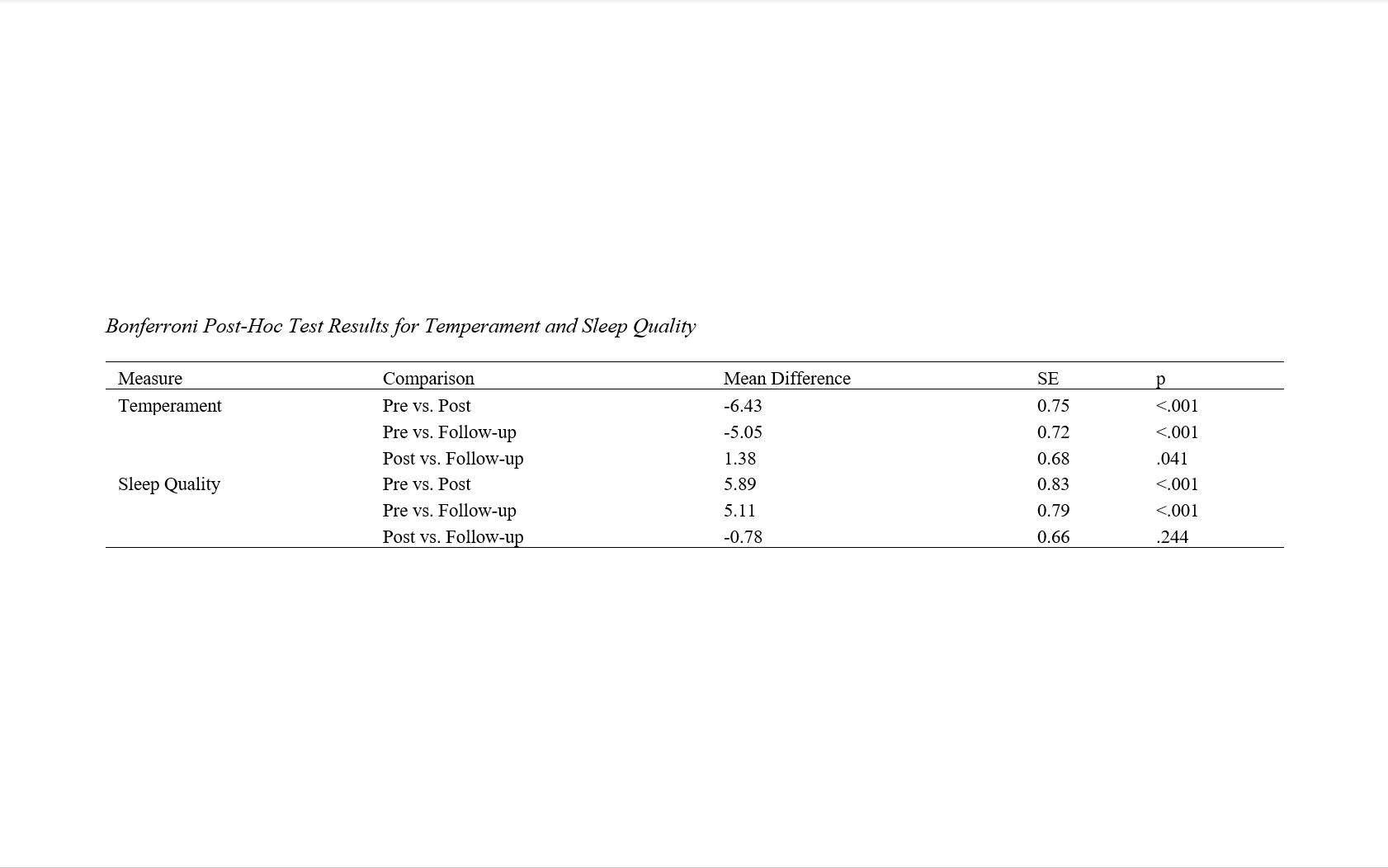Evaluating the Impact of Reality Therapy on Temperament and Sleep Quality in Adolescents with Learning Disorders: A Randomized Controlled Trial
Keywords:
Reality Therapy, adolescents, learning disorders, temperament, sleep qualityAbstract
The primary objective of this study was to evaluate the effectiveness of Reality Therapy in improving temperament and sleep quality among adolescents with learning disorders. This randomized controlled trial included 30 adolescents, aged 12 to 18, diagnosed with learning disorders. Participants were randomly assigned to either the intervention group (15 participants) or the control group (15 participants). The intervention group underwent twelve 60-minute sessions of Reality Therapy over a two-month period, while the control group received no therapeutic intervention. Temperament and sleep quality were assessed using the Revised Dimensions of Temperament Survey (DOTS-R) and the Pittsburgh Sleep Quality Index (PSQI), respectively, at three time points: pre-intervention, post-intervention, and two-month follow-up. Data were analyzed using analysis of variance (ANOVA) with repeated measurements and the Bonferroni post-hoc test, with SPSS-27 software. The results indicated significant improvements in both temperament and sleep quality in the intervention group compared to the control group. These improvements were sustained at the two-month follow-up. Specifically, the intervention group showed marked improvements in emotional regulation and sleep patterns, highlighting the efficacy of Reality Therapy in addressing these critical aspects of adolescent health. Assumptions for ANOVA were confirmed, ensuring the robustness of the findings. Reality Therapy significantly improves temperament and sleep quality in adolescents with learning disorders, with effects lasting beyond the intervention period. This study supports the use of Reality Therapy as a viable intervention for improving emotional and sleep-related outcomes in this population. Further research with larger sample sizes and extended follow-up periods is recommended to confirm these findings and explore additional benefits.
Downloads
References
Apostle, J. M. A., & Marques, J. A. P. (2022). Association Between Quality of Sleep and Overweight/Obesity in a Population of Adolescent Students. International Journal of Health Science, 2(76), 2-14.https://doi.org/10.22533/at.ed.1592762225119
Cao, L., Wang, S., Li, Y., Li, Y., Yuan, M.-Y., Chang, J.-J., Wang, G.-F., & Su, P. (2022). Longitudinal Trajectories of Sleep Quality in Correlation With Child Maltreatment: A Cohort of Early Adolescents.https://doi.org/10.21203/rs.3.rs-2220874/v1
Cavalcanti, L. M. L. G., Lima, R. A., Silva, C. R. d. M., Barros, M. V. G. d., & Fernanda, S. (2021). Constructs of Poor Sleep Quality in Adolescents: Associated Factors. Cadernos de Saúde Pública, 37(8).https://doi.org/10.1590/0102-311x00207420
Chehri, A., Shetabi, M., Khazaie, H., & Zakiei, A. (2023). Sleep Hygiene and Sleep Quality in Iranian Adolescents During the COVID-19 Pandemic. BMC psychology, 11(1).https://doi.org/10.1186/s40359-023-01165-8
Felden, É. P. G., Leite, C. R., Rebelatto, C. F., Andrade, R. D., & Beltrame, T. S. (2015). Sono Em Adolescentes De Diferentes Níveis Socioeconômicos: Revisão Sistemática. Revista Paulista De Pediatria, 33(4), 467-473.https://doi.org/10.1016/j.rpped.2015.01.011
Giannaki, C. D., Hadjigeorgiou, G. M., Aphamis, G., Pantzaris, M., & Sakkas, G. K. (2017). Restless Legs Syndrome in Adolescents: Relationship With Sleep Quality, Cardiorespiratory Fitness and Body Fat. Sleep Science, 10(01), 7-10.https://doi.org/10.5935/1984-0063.20170002
Glasser, W. (2000). Counseling with choice therapy: The new reality therapy. Harper-Collins. https://www.amazon.com/Counseling-Choice-TheoryWilliam-Glasser/dp/0060953667 Hakim, A., Ghaedi, F., & Latifi, S. M. (2019). The Relationship Between Sleep Quality With Body Mass Index and Blood Lipid Level in Adolescents. Biomedical Journal of Scientific & Technical Research, 21(2).https://doi.org/10.26717/bjstr.2019.21.003573
He, Y., Liu, R., Wang, D., Wu, Y. J., & Ren, K. (2023). Status and Influence Factors of Sleep Quality in Adolescents With Mixed Anxiety and Depression Disorder: A Cross-Sectional Study.https://doi.org/10.21203/rs.3.rs-3074589/v1
Jernslett, M., Thackeray, L., Orchard, F., & Midgley, N. (2021).The Experience of Sleep Problems for Adolescents With Depression in Short-Term Psychological Therapy. Clinical Child Psychology and Psychiatry, 26(4), 938-953.https://doi.org/10.1177/13591045211006157
Kim, Y., Kim, K. H., Kwon, H.-J., & Kim, J.-s. (2016). Associations Between Adolescents’ Sleep Duration, Sleep Satisfaction, and Suicidal Ideation. Salud mental, 39(4), 213-219. https://doi.org/10.17711/sm.0185-3325.2016.025
Kudubeş, A. A., Bektaş, M., & Gerçeker, G. Ö. (2023). The Predictive Power of Pain Characteristics and Sleep Quality on Fatigue in Adolescents With Cancer. Journal of Pediatric Hematology/Oncology, 45(6), 301-308.https://doi.org/10.1097/mph.0000000000002707
Meijer, A. M., Reitz, E., & Deković, M. (2016). Parenting Matters: A Longitudinal Study Into Parenting and Adolescent Sleep. Journal of Sleep Research, 25(5), 556-564.https://doi.org/10.1111/jsr.12406
Omotoso, A. B. O., Abdulmalik, J. O., Adediran, K. I., & Omigbodun, O. O. (2022). Sleep Quality and Its Correlates Among Adolescents Schooling in Northcentral Nigeria. Research Journal of Health Sciences, 10(3), 216-223.https://doi.org/10.4314/rejhs.v10i3.6
Peltz, J. S., & Rogge, R. D. (2019). The Moderating Role of Parents' Dysfunctional Sleep-Related Beliefs Among Associations Between Adolescents' Pre-Bedtime Conflict, Sleep Quality, and Their Mental Health. Journal of Clinical Sleep Medicine, 15(02), 265-274.https://doi.org/10.5664/jcsm.7630
Perfect, M. M., & Elkins, G. (2010). Cognitive–behavioral Therapy and Hypnotic Relaxation to Treat Sleep Problems in an Adolescent With Diabetes. Journal of Clinical Psychology, 66(11), 1205-1215.https://doi.org/10.1002/jclp.20732
Pucci, S., & Pereira, M. G. (2016). Sleep Quality in Adolescents: What's Discriminates Good From Poor Sleepers? Journal of Sleep Disorders & Therapy, 05(02).https://doi.org/10.4172/2167-0277.1000237
Putra, G. A. (2023). The Relationship Between Mobile Online Gameplay Duration and Sleep Quality in the Latest Adolescents. Physical Therapy Journal of Indonesia, 4(2), 173-176.https://doi.org/10.51559/ptji.v4i2.121
Rizzo, A., & Marra, P. (2023). Temperament, Character and Organisational well-being among Obstetrics and Gynaecology Personnel: a pilot study. Quaderns de Psicologia, 25(3), 9.https://doi.org/10.5565/rev/qpsicologia.1992
Rothbart, M. K., Ahadi, S. A., & Evans, D. (2000). Temperament and Personality: Origins and Outcomes. Journal of personality and social psychology, 78(1), 122-135.https://doi.org/10.1037/0022-3514.78.1.122
Safarzade, S., & Tohidinik, H. R. (2019). The Sleep Quality and Prevalence of Sleep Disorders in Adolescents. Journal of Research and Health, 471-479.https://doi.org/10.32598/jrh.9.6.471
Safitra, A. R., Muharyani, P. W., & Jaji. (2019). Relationship Between Sleep Hygiene and Sleep Quality in Adolescents Aged 12-15 Years. Jurnal Ilmu Kesehatan Masyarakat, 10(1), 59-66.https://doi.org/10.26553/jikm.2019.10.1.59-66
Vajari, S. M. (2024). The Effectiveness of Active Music Therapy on Anxiety and Sleep Quality in Adolescents Aged 11-14 With Stargardt Disease. Jayps, 5(1), 19-26.https://doi.org/10.61838/kman.jayps.5.1.3
Wubbolding, R. E. (2013). Reality therapy for the 21st century. Routledge.https://doi.org/10.4324/9780203768457 Yalch, M. M., Mehta, A., Watters, K. N., Dawood, S., & Schroder, H. S. (2023). Relative effects of sexual assault and temperament traits on cognitive characteristics of histrionic personality disorder. Violence and Victims.https://connect.springerpub.com/content/sgrvv/early/2023/03/31/VV-2021-0149.full.pdf Zhang, X. (2024). Exploring the Relationship Between Sleep Patterns and Depression Among Chinese Middle School Students: A Focus on Sleep Quality vs. Sleep Duration. Frontiers in Public Health, 12.https://doi.org/10.3389/fpubh.2024.1383884
Zhou, Q., Main, A., & Wang, Y. (2010). The relations of temperamental effortful control and anger/frustration to Chinese children's academic achievement and social adjustment: A longitudinal study. Journal of Educational Psychology, 102(1), 180-196.https://doi.org/10.1037/a0015908

Downloads
Additional Files
Published
Issue
Section
License

This work is licensed under a Creative Commons Attribution-NonCommercial 4.0 International License.















